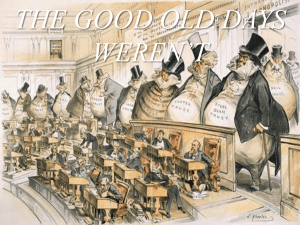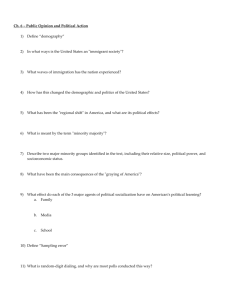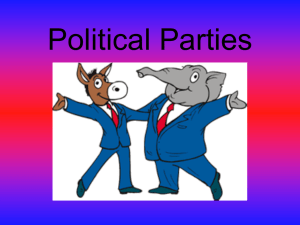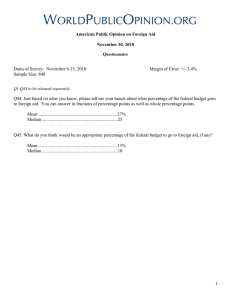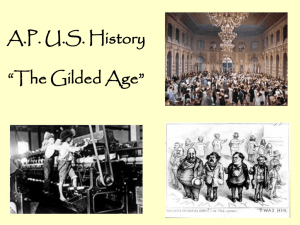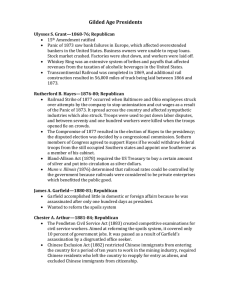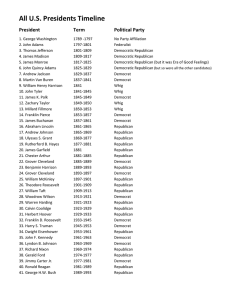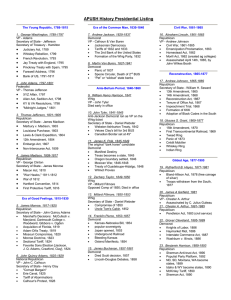Overview of Gilded Age Presidents
advertisement
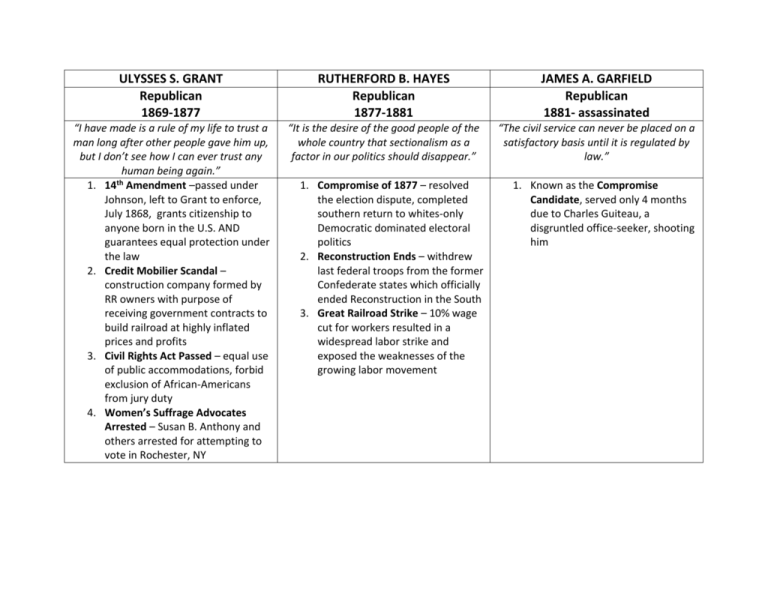
ULYSSES S. GRANT Republican 1869-1877 RUTHERFORD B. HAYES Republican 1877-1881 JAMES A. GARFIELD Republican 1881- assassinated “I have made is a rule of my life to trust a man long after other people gave him up, but I don’t see how I can ever trust any human being again.” 1. 14th Amendment –passed under Johnson, left to Grant to enforce, July 1868, grants citizenship to anyone born in the U.S. AND guarantees equal protection under the law 2. Credit Mobilier Scandal – construction company formed by RR owners with purpose of receiving government contracts to build railroad at highly inflated prices and profits 3. Civil Rights Act Passed – equal use of public accommodations, forbid exclusion of African-Americans from jury duty 4. Women’s Suffrage Advocates Arrested – Susan B. Anthony and others arrested for attempting to vote in Rochester, NY “It is the desire of the good people of the whole country that sectionalism as a factor in our politics should disappear.” “The civil service can never be placed on a satisfactory basis until it is regulated by law.” 1. Compromise of 1877 – resolved the election dispute, completed southern return to whites-only Democratic dominated electoral politics 2. Reconstruction Ends – withdrew last federal troops from the former Confederate states which officially ended Reconstruction in the South 3. Great Railroad Strike – 10% wage cut for workers resulted in a widespread labor strike and exposed the weaknesses of the growing labor movement 1. Known as the Compromise Candidate, served only 4 months due to Charles Guiteau, a disgruntled office-seeker, shooting him CHESTER A. ARTHUR Republican 1881-1884 “Men may die, but the fabrics of free institutions remain unshaken.” 1. Pendleton Act – Magna Carta of Civil Service reform, opened federal jobs to competitive exam rather than political connections in an attempt to end the spoils system and corruption 2. Chinese Exclusion Act – passed by Congress, would exclude all Chinese immigrants from entering the U.S. GROVER CLEVELAND Democrat 1885-1888 BENJAMIN HARRISON Republican 1889-1892 Sensible and responsible women do not want to vote.” 1. Interstate Commerce Act – required railroads to charge them from offering rate reductions to preferred customers 2. Dawes Severalty Act – subdivides Indian reservations into individual plots of land of 160-320 acres; surplus lands sold to white settlers 3. Laissez-Faire Democrat – does little for reform “We Americans have no commission from God to police the world.” 1. Pushed for higher tariffs to protect industry 2. Sherman Silver Purchase Act – increased amount of silver government was required to purchase every month; supported by farmers with large debts that could not be paid off due to deflation caused by overproduction; act would boost economy and cause inflation, allowing farmers to pay debt with cheaper dollars 3. Homestead Strike – steelworkers at Andrew Carnegies’ Steel Plan in Pittsburgh angry over pay cuts; ended in armed battle between strikers and federal troops POPULISTS PARTY 1891-1908 GROVER CLEVELAND ROUND 2 Democrat 1893-1896 WILLIAM McKINLEY Republican 1897-1901 - assassinated “The people are demoralized; most of the states have been compelled to isolate the voters at the polling places to prevent universal intimidation and bribery.” “Silver, which has been accepted as coin since the dawn of history, has been demonetized to add to the purchasing power of gold by decreasing the value of all forms of property as well as human labor, and the supply of currency is purposely abridged to fatten usurers, bankrupt enterprise, and enslave industry.” 1. Pullman Strike – strike against railcar company after wages depleted by 1/3, but town rent was not lowered; Federal troops brought in under the guise that Federal mail was being disrupted 2. Panic of 1893 – most devastating economic downturn of the century; overbuilding, overspeculation, labor disorders and cultural depression all contributed 3. Sherman Silver Purchase Act Repealed – gold draining from the treasury necessitated the repeal, little positive effect. President forced to seek help from J.P. Morgan to put U.S. economy back on solid ground, loan from Morgan for $60 million 4. Plessy v. Ferguson – Supreme Court rules separate but equal facilities OK legal segregation “War should never be entered upon until every agency of peace has failed.” 1. Party Platform 1892 – “Corruption dominates the ballotbox, the Legislatures, the Congress, and touches even the ermine of the bench.” 2. James B. Weaver – Third-Party candidate, won several states of electoral votes, thus establishing the importance of the Third-Party candidates from here forward 3. Wanted to bring together the aggrieved workers from across the nation, but majority of their support came from the west 4. Gained support from the increased wave of labor unrest, resulting in nationwide strikes in many industries 1. Gold Standard Act – stabilized the value of the dollar to one ounce of gold; killed the Populists’ dream of free silver 2. Victory represented a win for urban middle-class Americans over agrarian interests in the west and south; largest campaign fund invested for a presidential candidate - $15 million!

